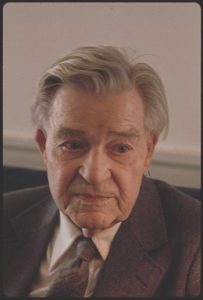
Gunnar Myrdal, 1980
*Gunnar Myrdal was born on this date in 1898. He was a white Swedish economist, author, and sociologist. Myrdal's writing used social economics to shed light on 20th-century American racism.
Karl Gunnar Myrdal was born in Skattungbyn, Sweden, to Karl Adolf Pettersson, a building contractor, and his wife, Anna Sofia Karlsson. He took the name Myrdal in 1914 after his ancestors' farm Myr in the province of Dalarna. In June 1919, he met Alva Reimer; they married in October 1924 and had the first of their three children in 1927. He graduated with a law degree from Stockholm University in 1923 and a doctorate in economics in 1927. Myrdal's Ph.D. thesis, The Problem of Price Formation under Economic Change, had three parts: The Basics of the Dynamic Problem of Price Formation, The Problem of the Profit of the Enterprise, and The Optimal Mode of Construction and Change, the most mathematical of the three, where he studied equilibrium of price formation under dynamic conditions.
In Myrdal's doctoral dissertation, published in 1927, he examined the role of expectations in price formation. His analysis strongly influenced the Stockholm school. Between 1925 and 1929, Myrdal studied in Britain and Germany. He was a Rockefeller Fellow and visited the United States in 1929–1930. During this period, Myrdal published his first books, including The Political Element in the Development of Economic Theory, in 1930. Returning to Europe, he served one year as an associate professor at the Graduate Institute of International Studies, Geneva, Switzerland.
Myrdal was initially fascinated by the abstract mathematical models in fashion in the 1920s. He maintained that the basic idea of adjusting national budgets to slow or speed an economy was first developed and articulated in his book Monetary Economics, published in 1932. He also designed the critical concept of circular cumulative causation, a multi-causal approach where the core variables and their linkages are delineated. Myrdal suggested that we need to evolve from the welfare state to the welfare world, enabling the redistribution of income and wealth within a country and globally.
He is best known in the United States for his study of race relations, culminating in his book An American Dilemma: The Negro Problem and Modern Democracy. Ralph Bunche and Lemuel Penn researched and edited this publication. The study influenced the 1954 landmark U.S. Supreme Court Decision Brown v. Board of Education. In Sweden, his work and political influence were important to establishing the Folkhemmet and the welfare state. Myrdal and his wife advocated for social engineering. During the Cold War era, In Beyond the Welfare State, he proposed the idea of the welfare world to overcome the limitations of the welfare state in the West. Myrdal's recommendations were not accepted by international technocrats or by developing countries. However, he also considered establishing a welfare world more complex than a welfare state.
1974 he received the Nobel Memorial Prize in Economic Sciences and Friedrich Hayek for "their pioneering work in the theory of money and economic fluctuations and their penetrating analysis of the interdependence of economic, social and institutional phenomena." When his wife, Alva Myrdal, received the Nobel Peace Prize in 1982, they became the fourth married couple to have won Nobel Prizes and the first to win independently of each other (versus a shared Nobel Prize by scientist spouses). Gunnar Myrdal had Parkinson's disease and was hospitalized for two months before he died in a hospital in Trångsund, south of Stockholm, on May 17, 1987. His daughter, Kaj Fölster, and his grandson, Janken Myrdal, were present.